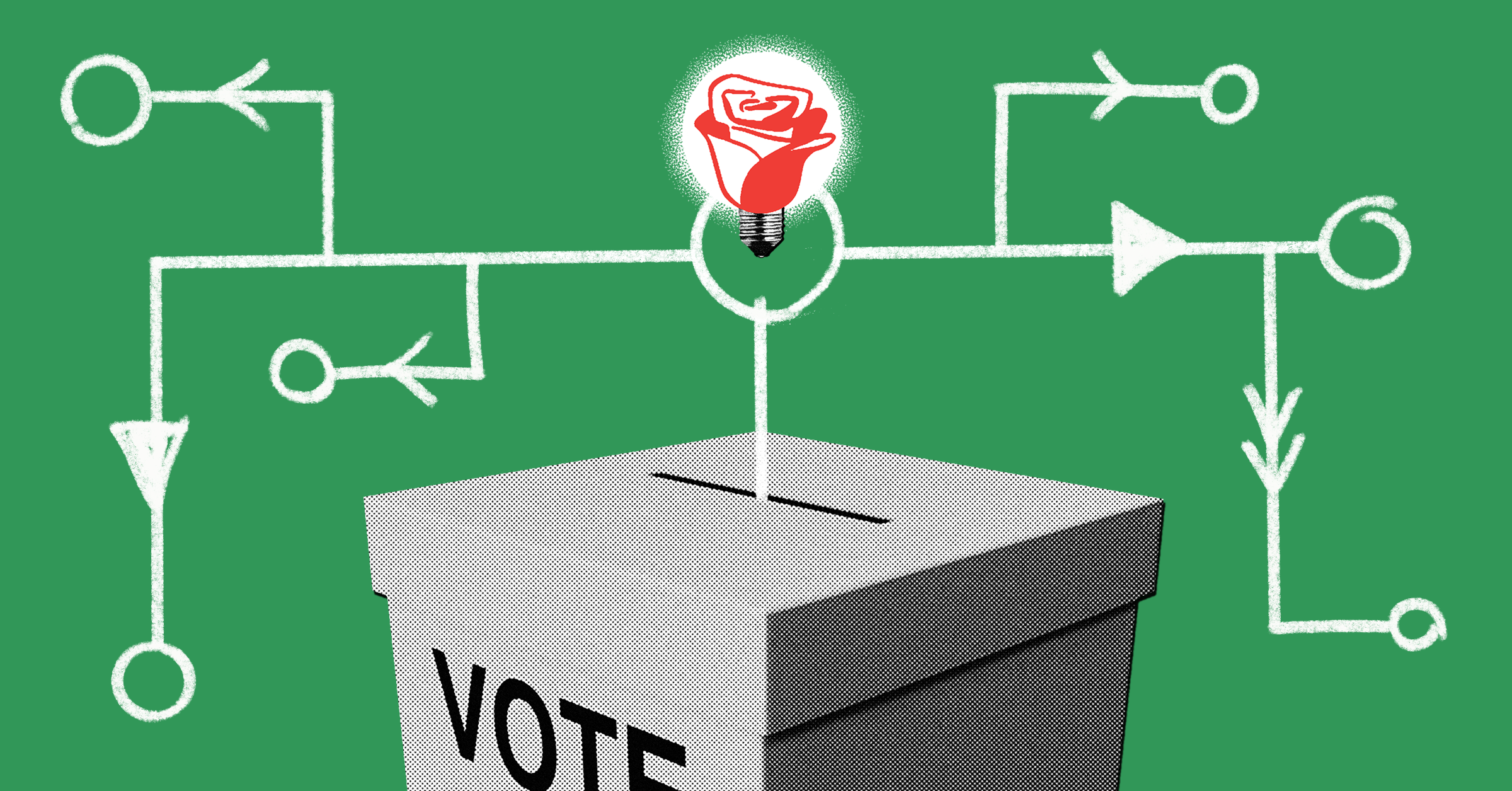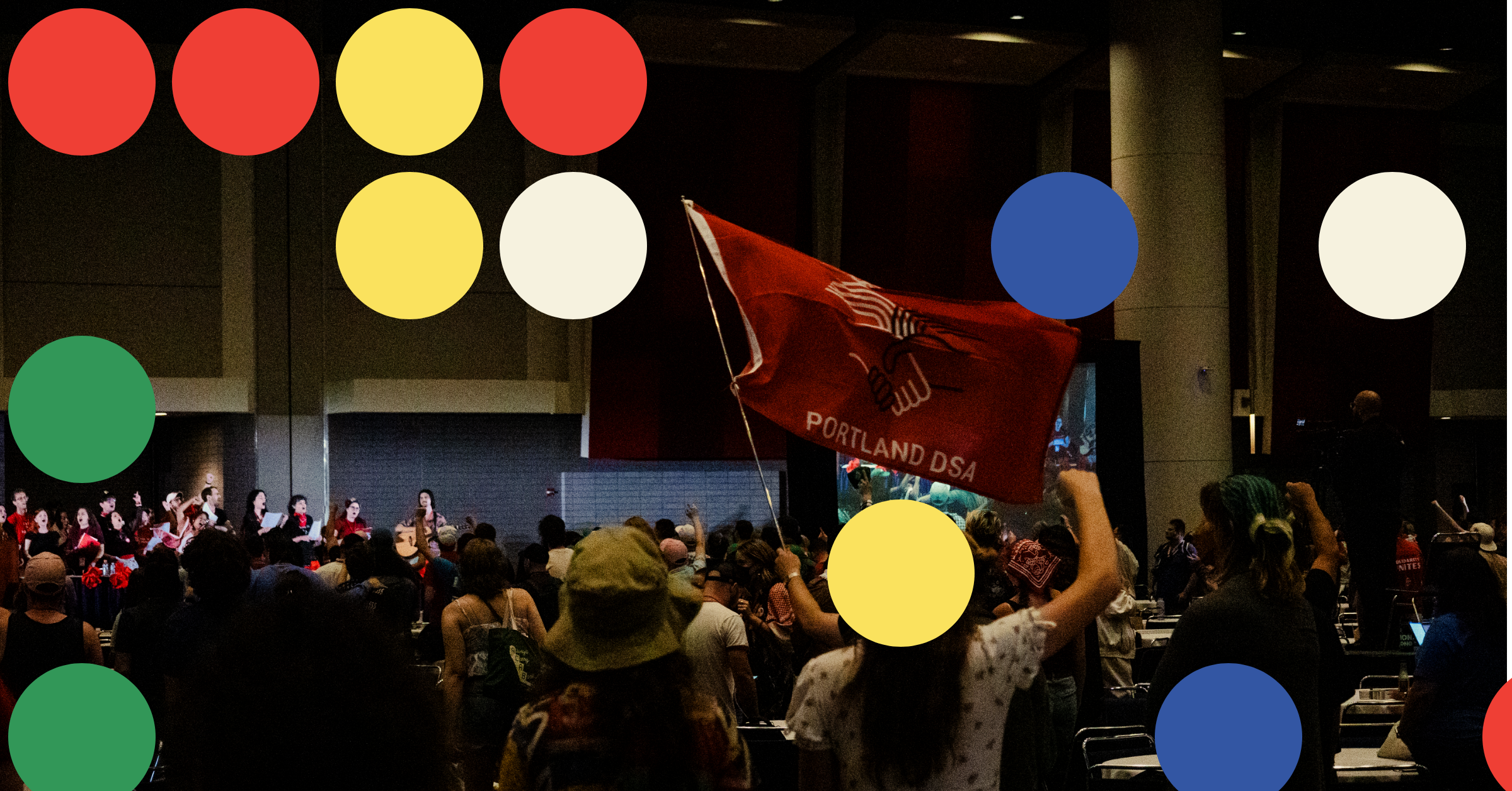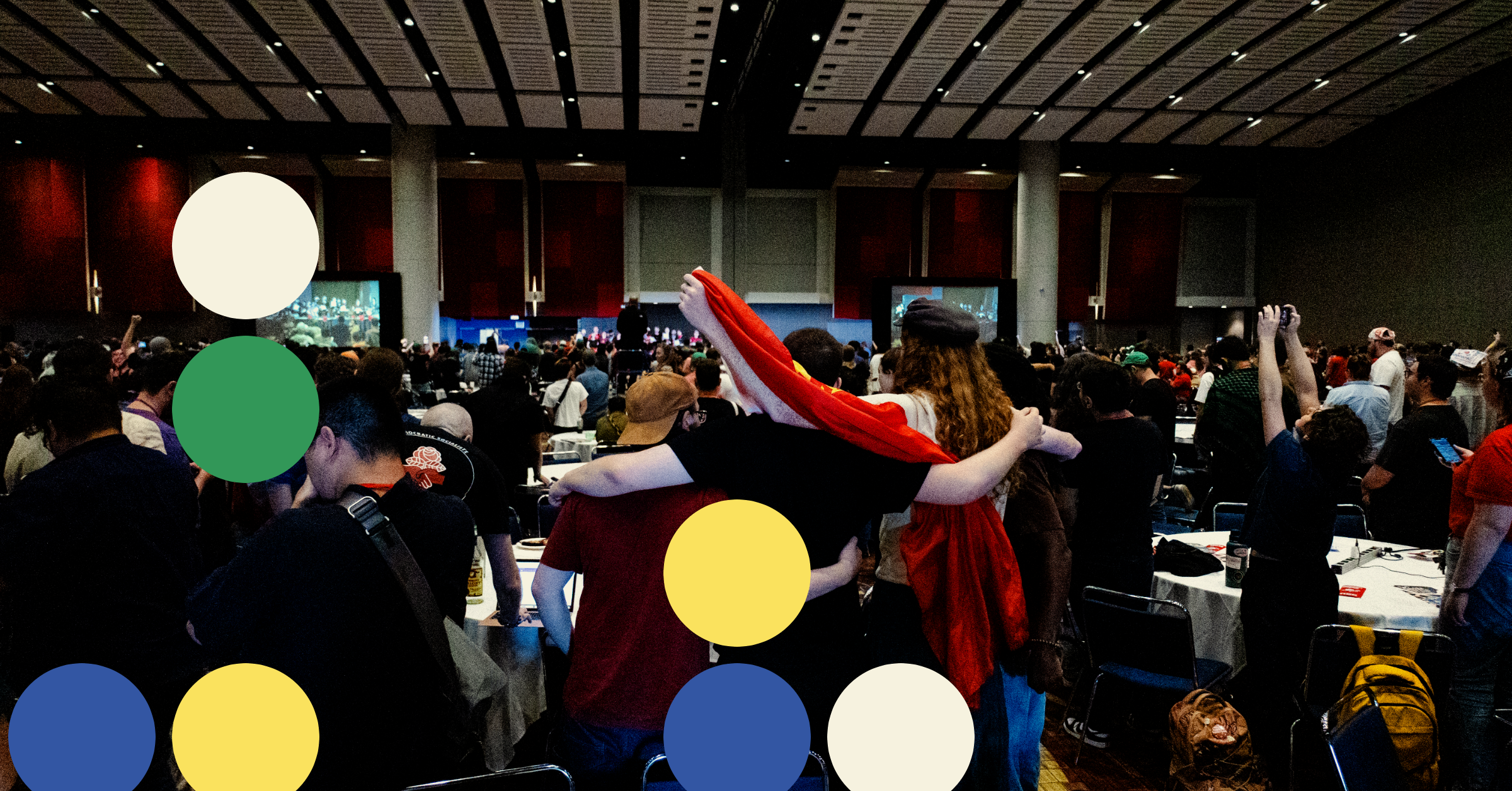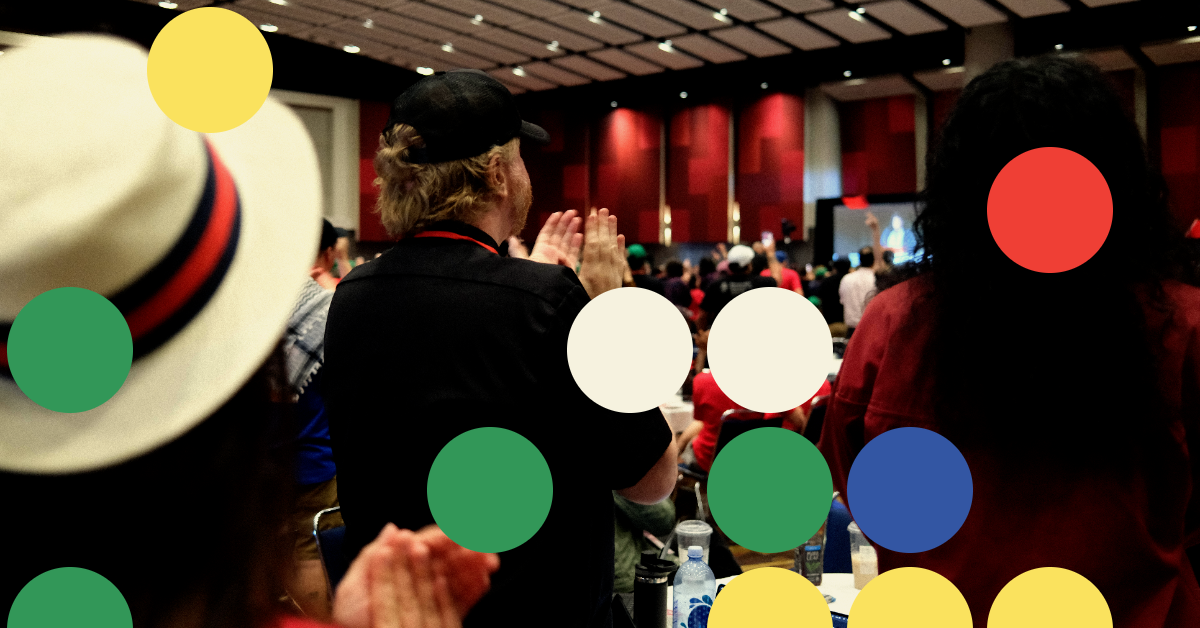In June, DSA’s Bread & Roses caucus voted on whether or not it would support Amendment #5 to Resolution #8: “Toward a Mass Party in the United States” at DSA’s 2021 National Convention. The amendment would recommit DSA to the position it took at the 2019 National Convention supporting an eventual split from the Democratic Party. It also recommends a variety of concrete steps the organization could take to build towards that split. In the vote, 55% of caucus members supported the amendment and 45% opposed. Given the close nature of the vote, Bread & Roses’s national leadership decided not to formally support the amendment as a caucus. Members of the caucus will support or oppose the resolution as they see fit. As part of the pre-convention debate, we at The Call are posting arguments for and against the amendment. The case against the amendment is presented here. The case for the amendment is presented in an article by Nick French.
The main electoral debate currently needed inside DSA is not over the precise form that a workers’ party will be established in the future. Instead, we should focus on discussing why and how chapters should build strong independent socialist electoral apparatuses now. And in so far as propagandistic advocacy of splitting from the Democratic Party undercuts our ability to build independent class power today, it makes the eventual formation of a mass workers’ party less likely.
For these reasons, DSA delegates should vote No on Amendment #5. Although many of the amendment’s concrete tactical proposals are good and should be implemented wherever feasible, its overall political thrust is one-sided and its underlying strategy, as articulated clearly in comrade Nick French’s recent article, has some significant political weaknesses.
What is Our Main Limitation Today?
The amendment as well as Nick’s motivation of it almost exclusively focus on avoiding the threat of co-optation and, thereby, on the importance of publicly reaffirming a split orientation from the Democratic Party. While I agree that co-optation is a significant danger, it’s not the main problem today.
DSA has grown by leaps and bounds since 2016 — in large part because the insurgent primary campaigns of people like Bernie Sanders, Alexandria Ocasio Cortez, and others on the Democratic ballot line helped rescue the Left from decades of marginalization. But we are still a relatively small and weakly rooted organization. Our key task is still how to scale up and to root ourselves in the multi-racial class.
All our recent experience, from Chicago to New York City to St. Petersburg, suggests that the main electoral path to building that type of organized power is through the “proto-party” (aka “party surrogate”) strategy laid out in the National Electoral Committee’s Resolution #8, “Toward a Mass Party in the United States.” This approach means building working-class power through socialist political machines that run committed fighters who are answerable to an independent, democratic organization, not the billionaires and their political representatives. It means using the campaigns and the resources of elected office to root socialism among the multi-racial working class, to promote bottom-up struggles (especially in labor), and to wage policy fights for working-class and democratic demands. DSA elected Phara Souffrant Forest’s office in Brooklyn, for example, regularly organizes canvasses of her district “to assess people’s needs and inform our neighbors about Phara’s platform.”
Unfortunately, implementing this approach is still the exception rather than the rule inside of DSA. Many chapters have yet to begin building up independent socialist electoral apparatuses. All too often we are limited to endorsing good leftist politicians who ask for our endorsement, but who are not part of a mass organization-building project.
Amendment #5 and Nick’s article commit to supporting a proto-party strategy. But re-introducing a relatively abstract position on the dirty break debate shifts our political energy in other directions — and it potentially undermines our ability to effectively defend a proto-party approach against those forces who suggest that DSA is currently just sheepdogging people into a capitalist party. Nick downplays the space available to carve out an independent class struggle political profile and to potentially win policy fights when he writes that being “a junior partner in the Democratic coalition” is the “worst of all worlds” because our demands will “be ignored or suppressed by the Democratic establishment” and because “we will be forced to absorb the stink of the neoliberal party brand.” Similarly, he overstates his case by suggesting that as long as we are associated with the Democratic brand that there is “little to differentiate us from the corporate mainstream in the eyes of most voters.”
But in New York our elected DSA candidates have helped lead on winning significant wins such as rent reform and they have succeeded in carving out a distinct profile from the establishment. Cori Bush, backed by the rest of the Squad, this week led a successful sit-in that helped force the White House to extend the eviction moratorium. Just last week landlord-backed mayor-to-be Eric Adams declared war on DSA. Experiences like Bernie Sanders’ insurgent campaigns, India Walton’s electoral win, and Nina Turner’s recent defeat show that even people who are not homegrown DSA candidates accountable to our organization can effectively differentiate themselves from the Democratic establishment even if and when they don’t call for a new party.
Overly focused on the danger of co-optation, Nick suggests that we “agitate for” a new party because, as he puts it, the “Democratic Party Will Not Be a Workers’ Party” — an approach I’ll call “dirty break propagandism.” But there are many different ways to avoid co-optation. Building an independent mass organization, primarying corporate Democrats, picking fights around transformative reforms, and supporting worker militancy can avoid co-optation while also effectively winning over the Democrats’ working-class base.
In so far as dirty break propagandism undercuts our current work to build a strong DSA — e.g. by making it more difficult for us to elect class-struggle candidates or for them to effectively fight for workers’ demands once in office — it actually undercuts moving towards a dirty break in practice.
The Dilemmas of U.S. Electoral Politics
The main way to advance to a mass workers’ party is to build up independent working-class political organization and class struggle. And most workers who we should be aiming to politically organize — into DSA and into a broader proto-party — currently are Democratic voters who want to see the Democrats represent the interests of working people. Moreover, this working-class base is rightfully terrified of a racist and increasingly authoritarian Republican Party — for better or worse, the Democratic brand today largely means “not Republican.”
Amendment #5 and the strategy underlying it underestimate the dilemmas posed by the real Republican threat and the fact that the vanguard of the working class, including its most militant unions, consistently support Democrats. For example, Nick’s article lists only the partisan primary system as a reason why it is “difficult or impossible to win elections otherwise” than by running as Democrats in most places. Where such a system does not exist, like in California and many municipal races, he suggests that there is far more space to successfully run as independents. Yet if this were true, why have independent left-wing campaigns also fared so poorly even in California and in local races? Kshama Sawant’s victory in Seattle is the exception that proves the rule. Our presidential electoral system, exacerbated by today’s highly polarized political context, unfortunately structures political conflict at all levels.
Unfortunately, there is no evidence yet that a significant constituency of traditional non-voters exists that is just waiting out there to be organized by socialists once we differentiate ourselves more from the Democratic Party. Third-party voting is at a historical low. To be sure, our de facto association with corporate Dems is a major problem in the long term and in many non-Democratic regions, which is a major reason why we eventually need a workers’ party with its own ballot line. But for the foreseeable future our main DSA electoral efforts will remain overwhelmingly oriented to winning working-class voters who normally vote Democrat.
Even the most militant and combative rank-and-file unions like the Chicago Teachers Union, United Teachers Los Angeles, and United Electrical Workers, for instance, periodically lend their support to establishment Democrats against Republicans. If we want to recruit large numbers of militant worker leaders to DSA and to convince fightback unions and others to actively participate with us in building a proto-party organization, it doesn’t make sense to ask them to be associated with a project of publicly denouncing the Democratic Party as a whole (not just its corporate establishment) and of publicly insisting that we’re seeking to split away as soon as possible.
It would be better to test and demonstrate the viability of a “harder” approach to the Democrats first before we push for DSA nationally to adopt it. Why not first experiment to see whether candidates running on the Democratic ballot line can run viable campaigns while denouncing the party as a whole and calling for an eventual split? (Though the amendment itself doesn’t explicitly call for the latter step, meaningful DSA public agitation for a new party as Nick recommends would at a minimum require that our candidates articulate this stance publicly.)
Unfortunately, more intransigent tactics may be premature for today’s particular context. We should always keep in mind that the starting point for successful Left politics is not how to delegitimize the Democrats and form a new party as soon as possible — it’s how to expand independent working-class political agency, which requires different tactics at different stages.
Many Ways to Break
Of course, Marxists often have to swim against the tide. If we were 100 percent certain that, to quote Nick, the “Democratic Party will not be a workers’ party” then we would have the obligation to tell this truth to our class. The same holds for the claim that all attempts to transform the Democrats will necessarily undercut the Left’s independent political profile and organized strength. But since we can’t be sure of either of these two points, there’s no need — and certainly no clear tactical utility — to take a stance that puts us out of step with even the most militant sectors of the working class and which gives the Democratic establishment a major propaganda weapon against us.
It’s true that past attempts at realigning the Democratic Party have not only failed, but have led to the Left getting incorporated into the status quo. But all these attempts, from the 1930s and 1960s onwards, were based on working with one wing of the establishment vs the most reactionary wing, and they relied on working within official Democratic structures, rather than fighting the entire corporate establishment via primary challenges and by building up an independent socialist organization and profile. What Bernie, the Squad, and candidates like India Walton are attempting to do is new and we don’t really yet know how far this process can go, nor whether it will generally help or hinder efforts to build DSA and a broader proto-party.
Many comrades argue that because official party structures don’t have real political power (true!), it’s absolutely impossible to ever capture the Democrats. I agree that we should generally oppose strategies to win official party structure leadership like county and statewide Democratic committees, since these efforts are largely a waste of time and risk making it harder for us to maintain an insurgent, antagonistic approach to the DP establishment. But the most concrete and proven alternative to this approach is building an independent proto-party that contests primaries, not dirty break propagandism (which has yet to be even tested locally yet).
Furthermore, we sound like dogmatists if we absolutely discount the possibility for leftists to capture the national Democratic Party summit through a hostile takeover via class struggle primary challenges that win both the presidency and the leadership of Congress. Nobody has yet made a strong case for why this approach is absolutely guaranteed to fail. Impossibility and unlikeliness are not the same thing.
More importantly, it’s hard to say whether such an approach will inevitably lead the Left to getting co-opted. So far the main impact of Bernie and AOC has been to help revive an independent U.S. left after decades of marginality and to heighten the contradictions between the Democratic establishment and its base. At this point, the major limitation we should point to in Bernie and AOC’s approach is not that they use rhetoric about transforming the Democratic Party, but that they aren’t directly building up, and part of, a mass membership political organization — a limitation that helps explain why they sometimes go farther than we would like in making deals with establishment Democrats.
Nick argues that “if we don’t consciously and publicly prepare to form such a party, it’s not going to happen.” This is overstated. A dirty break from the Democratic Party could take place because a) the establishment decides to kick the Left out (e.g. via changes to primary laws, etc.) once we get stronger or b) we grow strong enough to force through a democratization of the U.S. electoral regime (e.g. proportional representation, etc.), allowing us to then found a new party. Neither of those two outcomes requires that we spend years openly trying to convince working people that attempting to transform the Democratic Party is an illusion.
As I showed in my articles on the dirty break in Minnesota and in Britain, in both cases the main factor that eventually led to a split was a counter-offensive against ballot line insurgents from the party establishment (which changed primary laws in Minnesota and which arbitrarily rejected labor candidates in the UK), not socialists propagandizing for a dirty break. Though socialists intervening on capitalist-led ballot lines in both Minnesota and Britain did not call for a dirty break, this did not ultimately prevent such a break from taking place.
Or to use a historical analogy more comrades might be familiar with: advocates of bypassing AFL craft-unionism failed over decades to build independent mass industrial unionism outside of the AFL. The actual process of forming mass industrial unions came via an insurgency inside the AFL, in which CIO insurgents attempted to transform the AFL into an advocate of industrial unionism, leading the AFL bureaucracy to expel the CIO in 1937. Though the Democratic Party is not a working-class organization, a similar split process could take place.
Comrades generally respond to this argument by saying “Sure, capturing the Democrats might be possible, but since it’s so unlikely, we should wager on advocating a dirty break.” But getting to any form of break requires that we massively increase our capacity to defeat establishment Dems in primaries across the country — and nobody has yet demonstrated in practice that in today’s context the potential costs of dirty break propagandism (marginalization) are outweighed by the benefits (political differentiation). Since the Left and the labor movement are still so weak, our main focus today should remain on doing everything possible to scale up our organized power.
Comrade Nick is right that it is essential to win workers and DSA members to fight for a mass workers’ party. Keeping our eye on that prize will help us maintain an antagonistic approach to the Democratic establishment — but it doesn’t require that we insist such a party can only be formed through publicly advocating a dirty break from this point onwards. For the sake of averting climate catastrophe, reversing inequality, and defending democracy, we urgently need to build a strong DSA and a real proto-party with the millions of workers and unionists that made up Bernie’s base. Instead of getting ahead of ourselves, let’s focus on making that vision a reality all across the United States.




